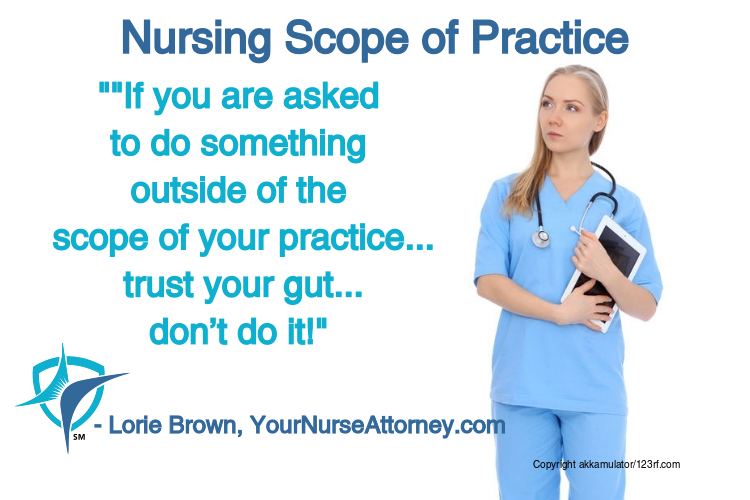As a licensed nurse, you are trained to follow orders and document your actions. However, in some circumstances, you may be asked to do something outside your nursing scope of practice. For example, have you ever had a supervisor say, “Just write an order for that. We always do that to help out the physicians”?
In that situation, your supervisor has put you between a rock and a hard place. They are telling you one thing but your gut is saying, “Hey! Wait a minute! I don’t have an order. I don’t have a policy and procedure and the physician is not available for me to ask.” Your gut tells you that this is something you should not do yet your supervisor is ordering you to do exactly that.
This is a dilemma many nurses frequently face. Although it’s not fair, you need to know what to do to protect yourself and your license.
If you are asked to do something outside of the scope of your practice … trust your gut … don’t do it! The physician just might not cover you for what you did and you will face the repercussions. It is also improper to ask for an order after the fact.
In addition, know your facility’s standing orders and whether you can adjust medications based on labs or vital signs and things like that. In general, your actions must be in the actual order or in the policies and procedures.
Taking it upon yourself to adjust or order medications or order labs is improper without the protection of a standing order or a policy and procedure. This would be considered practicing medicine without a license and exceeding your scope of practice.
In addition, as nurses, sometimes we know too much. For example, when we are in pain, we are inclined to take a pain medication that we had sitting around for a long time that was prescribed for another purpose or a previous episode of the same event. This also is considered practicing medicine without a license and exceeding your scope of practice.
It is really important that as nurses, we set the example. We cannot borrow a pain medication from someone else because we hurt our back. We have to go through the proper procedures as we are held to a higher standard than the general public and need to go through the same channels that the general public goes through. When we are sick, we should go to the doctor, emergency room, or urgent care to get a prescription.
Did you know if you are asked to take a drug test and have a positive result for a medication for which you don’t have a prescription or a medication that has expired or was prescribed for another reason, it is very difficult to protect and defend yourself?
When you take an expired medication or one borrowed from someone else, you are self-prescribing and practicing medicine without a license and exceeding the scope of your practice. It also is considered diversion because the medicine was not prescribed specifically for you or for that reason. Diversion simply means taking something from where it was supposed to go and moving it to another place.
This type of situation can be a big issue in healthcare.
Although you may not feel well, go to the doctor who knows the best way to help you. In this way, it is documented that everything was properly prescribed.
When you are faced with these difficult ethical dilemmas and you don’t have policies and procedures to support you, stand in your power and tell your supervisor that you do not feel comfortable doing something which is outside the scope of your practice.
Although you might lose your job, as I often say, you can always get another job but not another license. For more information about how to deal with situations that fall outside a typical nursing scope of practice, reach out to Nurse Attorney Lorie Brown at (317) 465-1065 today.









Wendie Howland says
If this is an issue, there’s a remedy: the nurses in the facility should take it upon themselves to prepare protocols for common situations, then work c the medical director, risk manager, and administration to polish and implement them. This includes the staff education to be sure everybody’s doing what they should be. This is an empowering experience for the nurses and educational for all concerned. Forty years ago an ICU I worked at had protocols for nurse-led skin care, getting labs for events, and vent weaning based on ABGs, to name a few. It’s not rocket science.
J. McDonald says
Thanks for this information & and reminder of what the scope of practice allows